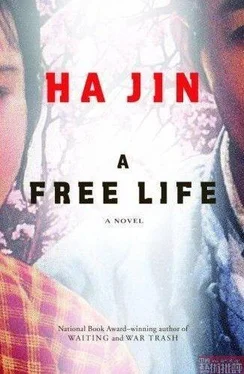After coming to America, Nan lived alone during the first one and a half years. He assumed that the distance of an ocean and a continent might help develop his affection for his wife into love, since sometimes he did miss her, but the numbness in his heart never went away. He also thought he'd forget Beina; yet she wrote to ask him to help her pay application fees at some American universities. He did that, but afterward he never heard a word from her. Obviously no graduate school admitted her. Somehow even her failure gave him more pain.
Every once in a while he felt attracted to women, especially if they had red hair, but he knew he couldn't love anyone ardently. He had desire, yet little passion. So he didn't try to know any woman. As a matter of fact, as far as desire was concerned, he was normal and strong. Pingping often said he was good in bed, yet he knew that wasn't the reason she had stayed with him: it was because of their child. And he was grateful for that, since he too wanted an intact family for Taotao. In this place neither he nor she had another person to turn to. They were stuck together and had to depend on each other to survive.
If only he were able to love her passionately! If only he weren't so sick at heart! He was tired, and this emotional fatigue had been sinking deeper and deeper into his being. Yet strangely enough, these days the desire for writing often stirred him and demanded an instant release. At work in the factory he wrote several poems, none of which turned out promising, so he put them aside and spent his time poring over Frost's Selected Poems.
EVER SINCE Don had told him about the factory's move, Nan had been looking for a job. He had also been reading books on poetry writing. Sometimes at night he tried to write poems, but the words he put on paper ended up seeming flat and incoherent. Usually the beginning would be strong, but then the lines would sag as the poem proceeded, as if there were a leak that sank the speaking voice. Nan was afraid he no longer had the youthful energy for making poetry. A decade ago, when he had just fallen in love with Beina, he had written more than a hundred poems, all of which came with ease. At times he had poured out two or three pieces a day; every part of her became his subject-her lamplike eyes, her peachy face, her pearly teeth, her dainty hands, her swift mind, her quivering hips, above all her fearless spirit. But after she had jilted him, he burned the notebook containing all his love poems. If only he could be possessed by that kind of head-over-heels feelings again. In contrast, though the desire to write frequently spurred him on, every line now was a big struggle, marred by diffidence and sluggishness.
He wished he could hold on to his current job. Just a few years more would give him a period of apprenticeship, during which he could read many books and learn more about literature besides the craft of poetry writing. But that was just a fantasy. He had to find another job soon. He went to a steakhouse in Watertown and told the manager that he had waited tables at a Chinese restaurant. The balding man looked askance at him, twisting his swallow of a mustache with his long fingers. Apparently Nan couldn't lie without blushing. He was relieved two days later when the man told him they couldn't hire him. He had been daunted by their menu, which contained many Italian words. Just a glance at it gave him a headache, let alone the long wine list on which almost all the names were unfamiliar to him. Nan turned up at a drugstore near Harvard Square in Cambridge; its owner, a portly gentleman, was interested in hiring him as an evening-shift supervisor, but first the applicant would have to show him his green card. Nan produced his work permit, but the man wouldn't accept it, saying he'd be fined thousands of dollars if the INS caught him. He'd take nothing except a green card, which Nan had applied for but couldn't get until the next year. Then Nan entered a used bookstore with a HELP WANTED sign leaning against a stack of moldy, leather-bound tomes in the window. A fortyish woman wearing pince-nez said they needed someone to work at most twelve hours a week, not a full-timer.
At last, a week before Christmas, a security guard's position opened up at Hampden Park, a condominium complex in Newton, just off Route 9. Sandy, the manager, told Nan to come in and fill out some forms. He went there the next morning. The place consisted of three connected buildings, behind which were a swimming pool and a parking lot shaded by two long sheds. There were altogether about 120 condominiums, all sharing the same front entrance, and most of the residents were retirees.
Sandy was a stocky man of around forty, with salt-and-pepper hair, a squarish face, pale skin, and narrow eyes. Nan sat in the manager's office in the basement, a metal desk between him and Sandy. After describing the job and asking Nan a few questions, Sandy said, "You'll make good money here."
Nan grinned incredulously.
"You have a cynical smile, young man. You don't believe me?" asked the manager.
"Honestly, no. How can I make good mahney eef you pay me jahst five dollars an hour?"
"Well, I can't do better than that."
"I know I cannot make a lot of mahney here, but I need zer jawb and medical insurance."
"Believe me, for this kind of a job you won't get any benefits elsewhere."
"Zat's true."
"I like your honesty, though."
"The troos is that no matter how hard I work, I can never be more zan a Social Security nahmber." Nan blurted out the sentence that had echoed in his mind for days.
Sandy stared at him in amazement, then his face relaxed. He said, "I can't either. You're a smart guy and I know what you mean. Here's a uniform. Always put it on when you come to work."
Usually there were two security guards working on the same shift at Hampden Park. One serving as a concierge stayed in the office at the front entrance, which was so tiny that it could contain only one chair, while the other patrolled the parking lot behind the buildings. Nan was pleased to take charge of the backyard, because the guard at the front office had to pay attention to the people passing by, since every visitor must be announced. The guard in the parking lot was less busy. Nan could walk around, but was not permitted to sit down. If it snowed or rained, he could remain under either of the two long, wall-less sheds that covered the entire parking lot. But he couldn't read while standing below so many windows-the residents would have reported him to Sandy if they saw him do that. So he carried a pocket English-Chinese dictionary with him. Now and then he'd take it out and go over a few word entries he had marked in pencil.
The guard in the parking lot was also supposed to help the residents load and unload their cars. If they returned from shopping, he was supposed to give them a hand, carrying the grocery bags to their apartments. This was no problem for Nan; besides, most times people would tip him a dollar or two. If it was a good shift, he could make an extra ten dollars. Some middle-aged people avoided using him, reluctant to waste money on tips, especially those who drove cheap cars. A Hispanic woman named Maria, around thirty, always asked him to carry stuff for her. She was very close to Ivan, another guard who usually worked the night shift, and she tried to be friendly with Nan too, calling him "a great guy." But she'd never tip him. At most she'd offer him a drink, which he always declined. She had thick auburn hair and a fine figure, and would wave at Nan whenever she came to the parking lot.
Besides the day shift, Nan occasionally worked at the front office at night. He hated to be seen by everyone at the entrance and dared not look at his pocket dictionary before ten p.m. There were four other guards, but he was scheduled to work mainly with Ivan and Tim. Tim was a spare black man from Canada, around sixty, and wore a gray mustache and a lumpy ring though he was single, divorced long ago. He often talked to Nan about his retirement plan. He was working another job too, driving a shuttle bus between Logan Airport and downtown Boston. With a mysterious look and some pride he told Nan that he had to hold two jobs to make enough money for a mansion he had been building in a suburb of Toronto. That was his dream home, which he'd retire to and which would cost him more than half a million dollars.
Читать дальше












